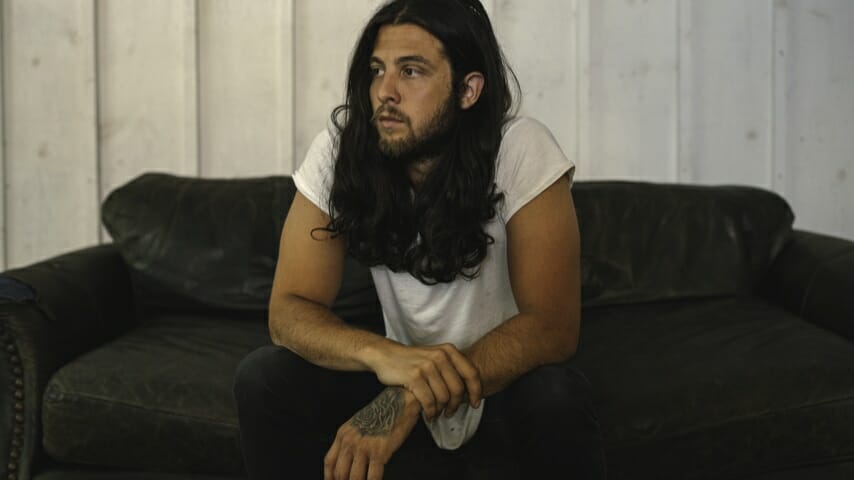Billy Raffoul Follows in His Father’s Footsteps on Latest LP
Photo by Travis Latam
It does look rather awkward on a business card, admits 26-year-old Canadian rocker Billy Raffoul of the decidedly strange moniker of his LLC touring company, We Want Dentist. But—as with most of the whimsical, folk-sparse material on his lockdown-tracked debut, International Hotel, all delivered in a rough-shod, whiskey-honeyed rasp, there’s actually a great story behind it. In his tiny hometown of Leamington, Ontario, his clan has eked out an existence that was at some points hardscrabble—his grandparents picked tomatoes, in fact, to keep his father Jody in class. “But when their son, at 16, said, ‘I’m not going to high school anymore and I’ve started a band instead called The Purple Eyebrows, that phrase was what my grandmother yelled at my dad in her broken Lebanese—‘We want dentist!’,”: he says. “Singular, that was how she said it, and she’d get her point across by slamming her fist on the table. They were picking tomatoes so he could become a doctor or a dentist.”
And Jody impulsively followed his Bohemian path, forming a popular roadhouse-ready outfit called The Bad Apples, recording solo albums that he initially sold from the trunk of his car, and even winning the grand prize in a nationwide contest: opening an arena concert for Bon Jovi in the artist’s native New Jersey. But along the way, his songwriting—rooted in the same Dylan, Beatles, Otis Redding and Sam Cooke albums that he would later play for Billy and his keyboardist brother—grew stronger, more meat-and-potatoes solid, like “The River”-era Springsteen. So the apple (tomato?) didn’t fall far from the tree, when Junior first accompanied his father onstage at 9. “But I couldn’t play anything yet—my uncle threw me up there while my dad was doing a combination new-release show and a Hurricane Katrina benefit, and I was just shaking like a leaf. I could barely stand,” recalls the young Raffoul, who got an electric guitar at ten and eventually began backing Jody on rhythm guitar before starting his own solo career playing to long-haul truck drivers at a local rest stop.
Raffoul came to understand the throwing-your-life-away shock his grandmother must have felt—his dad was on the road constantly, rarely around for his crucial growing years. But he also saw the fruit-picking tenacity that Jody applied to his craft, which became a bedrock principle when he started composing his own material. “We never really spoke about it when I was young, but to him it was like a going-to-work kind of thing, and not in a negative way,” he recalls. “So he showed me from the beginning that this is something that you have to live and breathe—you have to eat and sleep music if you do it for a career, and I saw him do it every single night and day. He was really inspiring.” Dad’s songs might not have topped any charts in Canada, but they were rock-solid, heart-and-soul honest and filled with arena-huge hooks. He couldn’t help but pick up regular pointers on how to construct his own. “He was a serious student of music,” he adds.
Remembering a 20-year old argument between his parents over the relative worth of U2 (mom was for, dad strongly against), Raffoul watched his father eventually come around and become a big Bono fan. So he pushed himself to constantly explore new sounds that weren’t on the family Dylan/Beatles syllabus. Like Springsteen, whose complex catalog he dove into, devoured, then began to separate and grade. He listened to the Greetings From Asbury Park debut 50 times over, studying it from every angle, but eventually settled on the furious “Darkness on the Edge of Town” as his favorite. “And I’d be lying if I said I wasn’t trying to go in the direction of Nebraska with my album,” he sighs.
How did the artist find his own charismatic style? First, he watched his dad roll the dice on his second Simple Life solo album in 1999. It was all acoustic, recorded in one scratchy take and disarmingly vulnerable. But it wasn’t until 2012—when his mother had a tragic near-death experience—that he achieved that same level of confessional honesty, penning a track called “Flowers for Mae” in a voice that he finally felt was his own unique instrument. “My singing had sounded forced before, but this time it sounded honest, so that recording is what I always came back to when I started playing live,” he says of the cut, which he’ll probably never release. And when he wound up trapped back in his family hometown during lockdown, with a full debut disc due after a couple of misfiring EPs, he returned to dad’s DIY “Simple Life” gamut and pieced it together in isolation.
-

-

-

-

- Curated Home Page Articles By Test Admin October 21, 2025 | 3:10pm
-

- Curated Home Page Articles By Test Admin October 21, 2025 | 2:57pm
- Urls By Test Admin October 21, 2025 | 2:57pm
- Curated Home Page Articles By Test Admin October 21, 2025 | 2:55pm
-

-

-

-

-

-

-

-

-

-

-

-

-

-

-

-

-

-

-

-

-

-

-

-

-

-

-

-

-

-

-




































